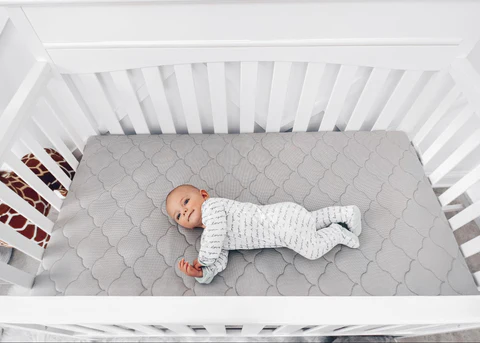How To Keep Baby From Rolling Over In The Crib An Ultimate Guide

Introduction to how to keep baby from rolling over in the crib
Keeping your little one safe and sound is a task that might keep you on your toes 24/7. One major concern that haunts new parents is their baby rolling over in the crib.
This article will provide a comprehensive guide to understanding how to keep your baby from rolling over in crib, how to respond, and most importantly, how to ensure your baby’s safety during sleep.
Why does my baby roll onto their stomach while sleeping?

Babies usually roll onto their stomachs as they start developing motor skills, which are crucial for their growth and independence.
This action is often a result of them trying to get comfortable, explore their surroundings, or simply because they enjoy the newfound ability to move around.
What are the signs of rolling over?

Look out for signs such as your baby trying to lift their head and shoulders using their arms during tummy time or attempting to flip during changing. These are clear indications that they are gearing up to roll over.
When do babies start rolling?
Typically, babies start to roll over anywhere between 3 to 6 months. However, each baby is unique and may reach this milestone at their own pace.
How long does it take for a baby to roll over?
Rolling over is a gradual process. It usually begins with the baby learning to flip from their belly to their back, which might take a few weeks. Once they master this, they may start flipping from back to belly, which could take another few weeks.
What to do when your baby starts rolling
When your baby starts rolling, it’s crucial to ensure their safety during sleep and playtime. Always supervise them during tummy time, remove any loose bedding from the crib, and ensure they’re sleeping on a firm, flat surface.
What is the safest sleep position?
According to pediatric experts, the safest sleep position for a baby is on the back. The ‘Back to Sleep’ campaign, promoted to reduce the risk of SIDS (Sudden Infant Death Syndrome), strongly recommends this.
What to do when your baby rolls in their sleep
If your baby rolls over in their sleep, you might naturally worry. However, once your baby can independently roll over, you don’t need to keep flipping them onto their back. Just make sure to place them on their back when initially putting them to sleep.
Can I prevent my baby from rolling during sleep?
While you cannot completely prevent your baby from rolling over, you can ensure a safe sleeping environment by keeping the crib free of loose items like pillows, blankets, and stuffed animals.
Is It ok if the baby rolls on the stomach when sleeping?
Once your baby can roll over independently both ways (from back to belly and vice versa), it’s generally safe for them to sleep on their stomach. However, always consult with a pediatrician if you have concerns.
What do you do when a baby rolls over in a crib?
Ensure your baby’s safety by keeping their crib clutter-free, offering them plenty of supervised tummy time during the day, and adhering to the safe sleep guidelines recommended by experts.
How to help your baby roll over
Encouraging tummy time, providing safe toys to grab and manipulate, and showing your baby how to roll over can be helpful in teaching them this skill.
How to keep baby safe during sleep
Keep the baby’s sleep area clear of any loose or soft objects, maintain a comfortable temperature, use a firm mattress, and place your baby on their back to sleep. These steps significantly reduce the risk of SIDS.
How to keep baby from rolling over in crib: Conclusion
Your baby rolling over is an exciting milestone, but it can also be a stressful one. However, by following safe sleep practices and setting up a secure sleep environment, you can navigate this stage with confidence.
Remember, while it’s vital to remain vigilant, it’s equally important to acknowledge and celebrate your baby’s progress in achieving these significant developmental milestones.
How to keep baby from rolling over in crib: FAQs
How do I stop my baby from rolling over in his crib at night?
It’s challenging to prevent a baby from rolling over in the crib, especially once they’ve learned how. Instead, focus on creating a safe sleep environment—free of loose bedding, toys, and bumpers.
Always lay your baby down on their back to sleep. If they roll over on their own, it’s generally safe to leave them be.
Are sleep sacks safe for babies who can roll over?
Yes, sleep sacks are generally safe for babies who can roll over. They can keep your baby warm without the risk of loose blankets. Ensure the sleep sack is the correct size to prevent your baby from sliding inside.
What to do if a baby keeps rolling on their side to sleep?
Babies often roll on their sides to sleep once they start rolling. It’s usually safe if your baby rolls onto their side independently. However, always start their sleep time by placing them on their back.
Is it normal that my 2-week old baby can roll over already?
It’s unusual, but not impossible, for a 2-week old baby to roll over. However, in such cases, rolling over is likely a reflexive action rather than a deliberate movement.
If your baby is showing early signs of rolling over, it’s best to discuss this with your pediatrician to ensure their development is on track.
How should a baby’s crib be outfitted?
A baby’s crib should be simple and safe. It should contain a firm mattress covered by a fitted sheet. Avoid using loose bedding, pillows, crib bumpers, or stuffed toys, as they increase the risk of suffocation and Sudden infant death syndrome. (SIDS)
Why won’t my baby roll over?
Each baby develops at their own pace. If your baby hasn’t started rolling over by 6 months or shows no interest or attempt in doing so, it’s a good idea to consult your pediatrician. They can provide insights and assure whether your baby’s development is on track.
What do you do when a baby rolls over in the crib?
If your baby rolls over in their crib, ensure their safety by keeping the crib free of loose bedding or toys. Make sure they have plenty of supervised tummy time during the day to strengthen their muscles.
If they’re rolling over during sleep, ensure they start on their back, but there’s no need to flip them back if they roll over independently.
Your baby’s safety is paramount. By implementing these guidelines and understanding your baby’s development, you can ensure a safe and comfortable environment for them.
Always remember, every baby is unique and develops at their own pace. It’s essential to celebrate each of their milestones and enjoy the journey of their growth and development.
